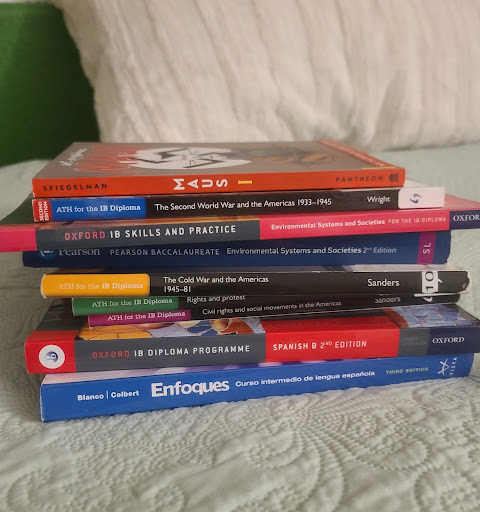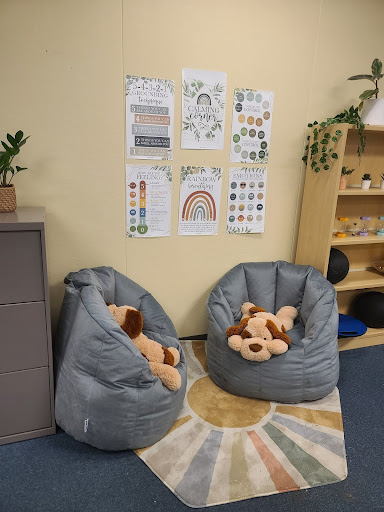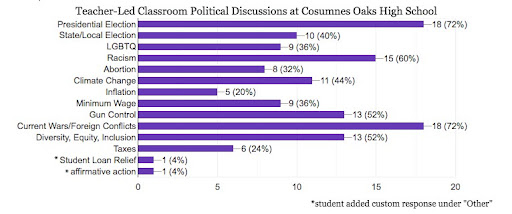Students at Cordova High School claim that the International Baccalaureate curriculum significantly increases their stress levels, although it offers academic rewards upon completion.
Academic pressure can originate from various sources such as familial expectations, internalized demands, or societal obligations. A young person under a lot of academic strain may struggle to cope with daily life.
Advanced Placement credit is usually awarded to IB candidates who complete the rigorous IB program, a demanding two-year, pre-university program that culminates in an IB diploma.
Often, graduates of the program automatically move up the admissions pool and go to the best universities and colleges in the country.
According to Cordova High School students, the program can be demanding and stressful.
“Being in full IB it feels like some teachers don’t seem to understand that IB and honors don’t mean more homework or busy work assignments,” said junior Zoe Lobbestael, who is on the path towards receiving a full IB diploma. “I took full IB because I wanted faster-paced classes where we go deeper into subjects and learn more. It seems as though teachers want IB kids to never have free time and a lot of the people taking full-time are there because it looks good on college apps, but we never have time to do anything other than homework if we do our best on everything.”
Most IB students have six or seven classes and each class requires instead a lot of homework assignments and projects, so the amount of work and studying that each student needs to do within a week is a great deal, said Amy Xiong, a junior taking an alternative route of IB where students take a few IB classes and not all seven.
In the likely event they have jobs, juniors and seniors studying in the IB program must distribute their time between finishing all of their assignments and going to work, said Xiong. If they participate in sports, it becomes even tougher to manage time, she added.
“You know when you’re getting older and you know you’re going to have to start working, but then it’s hard to have a job when you have so many classes,” Xiong said.
IB “creates a lot of pressure to do well” and the pressure “creates a divide: do you want to do good? or do you want to be able to have a job?” said Tyler Schubin, a junior, taking the same alternative route as Xiong.
Stephanie Poland, IB Diploma Coordinator at Cordova High, said some students withdraw from the IB program due to the higher-than-expected workload, coupled with the substantial time, energy, and effort demanded by each class.
The complete IB program’s seven courses all require analytical, research, and thinking skills. IB also requires its students to complete the theory of knowledge course, a 4,000-word extended essay, and 150 hours of creativity, action, and service hours.
“(That’s) on top of all the other things that you have to do in high school, and what you want to do,” Poland said. “There’s just a lot that has to fit into your schedule.”
Jadria Newby, a mental health specialist at the Student Union, a mental health facility on Cordova High’s campus, expressed a similar sentiment.
“I see that where people are just kind of getting burned out, right?” Newby said. “So they get to the point where they just drop (a few IB courses or the entire IB program). I think sometimes so, you know, we work with students a lot on how to balance these kinds of things and kind of looking at like, what can you work within your schedule?
“Figuring out that balance is a skill you’ll need for the rest of your life. We’ve had a lot of students here in full-blown panic mode.”
Tony Thurmond, the State Superintendent of Public Instruction, has always placed a high premium on the mental health and well-being of kids, said Brody Fernandez, public information officer for the California Department of Education. The Department has several projects that directly address the social-emotional needs of pupils, said Fernandez, including investments in community schools that can fund additional mental health professionals on school grounds.
Thurmond also plans to pursue student mental health measures in the Legislature in 2024, said Fernandez, including greater funding for mental health resources.
Schubin said he suffers from a sort of IB domino effect. His schedule is as follows:
- School: 8:30 a.m. – 3:30 p.m.
- Home: 4:15 p.m. (by bus)
- Eat, relax, change, etc.: 4:15-4:45 p.m.
- Start working on homework: 5-7 p.m.
- Gym: 7-8 p.m.
- Dinner: 8:30 p.m.
- Keep working on homework, and finish homework: 9-10 p.m.
- Study for tests/quizzes or assignments for the next day (two to five days a week): 10-11 p.m. or 11:30 p.m.
“I find myself staying up past midnight, a lot of time, and then it snowballs,” he said. “I’ll stay up late for one night and then I’ll come to school tired. But then there’s so much work from that day that I stay up even later the next night. And so it gets worse. It gets worse until I catch up.”
With such a small group of people taking the full IB diploma program – this year there are 14 students enrolled at Cordova High, all juniors – connecting with fellow program participants might seem easy. But that may not be the case, said Lobbestael.
“It’s incredibly isolating being in full IB like it’s such a small group of us and we have all our classes together,” she said. “I don’t feel connected to most of the people in IB. I wanted to be academically challenged. I didn’t want to be socially isolated. With full IB, our classes don’t allow us to show our personalities and form those bonds. Even the people who I occasionally talk to are nothing deeper than surface-level conversations.”
Poland said there are meetings with the IB teachers four times a year, and mental health comes up in their discussions. Every year they discuss what they can do to help students, she said, but it’s not easy to find solutions.
“It’s a tough one to try to figure out as teachers how to support the students to help you guys break down tasks and do time management so it doesn’t feel as stressful because there is a fair amount of stress that comes with the program just because of all the different pieces and all the workload for the class,” Poland said.
Since real social connection is so crucial and significant for mental health, said Newby, and because people feel alone, worried, and that no one else gets it, she’s hoping that the staff members will be willing to discuss it more.
“I hate to see students feel like they don’t know what to do,” said Newby. “So they’re like I’m just gonna drop out and maybe give up on something they wanted because they’re not getting that support.”
According to Schubin and Xiong, maintaining a relationship can demand additional effort when juggling IB program coursework.
“I find myself spending a lot of time with her,” Schubin said. “We’re usually calling during homework because it’s all you can do. I mean, we try to take the time on the weekends to see each other. But I’ve noticed that like within these past two or three months, we haven’t been able to see each other as much as we have. Just things have ramped up so much. And we’ve even considered substituting our normal dates for study dates, so we can still see each other.”
With all the stress that comes with managing IB classes, it’s hard to know if all the work students put in is worth it, said Lobbestael.
“I don’t want to be looked down on because I don’t think IB is right for me,” she said. “I know I can do all the material, just at what cost?”














